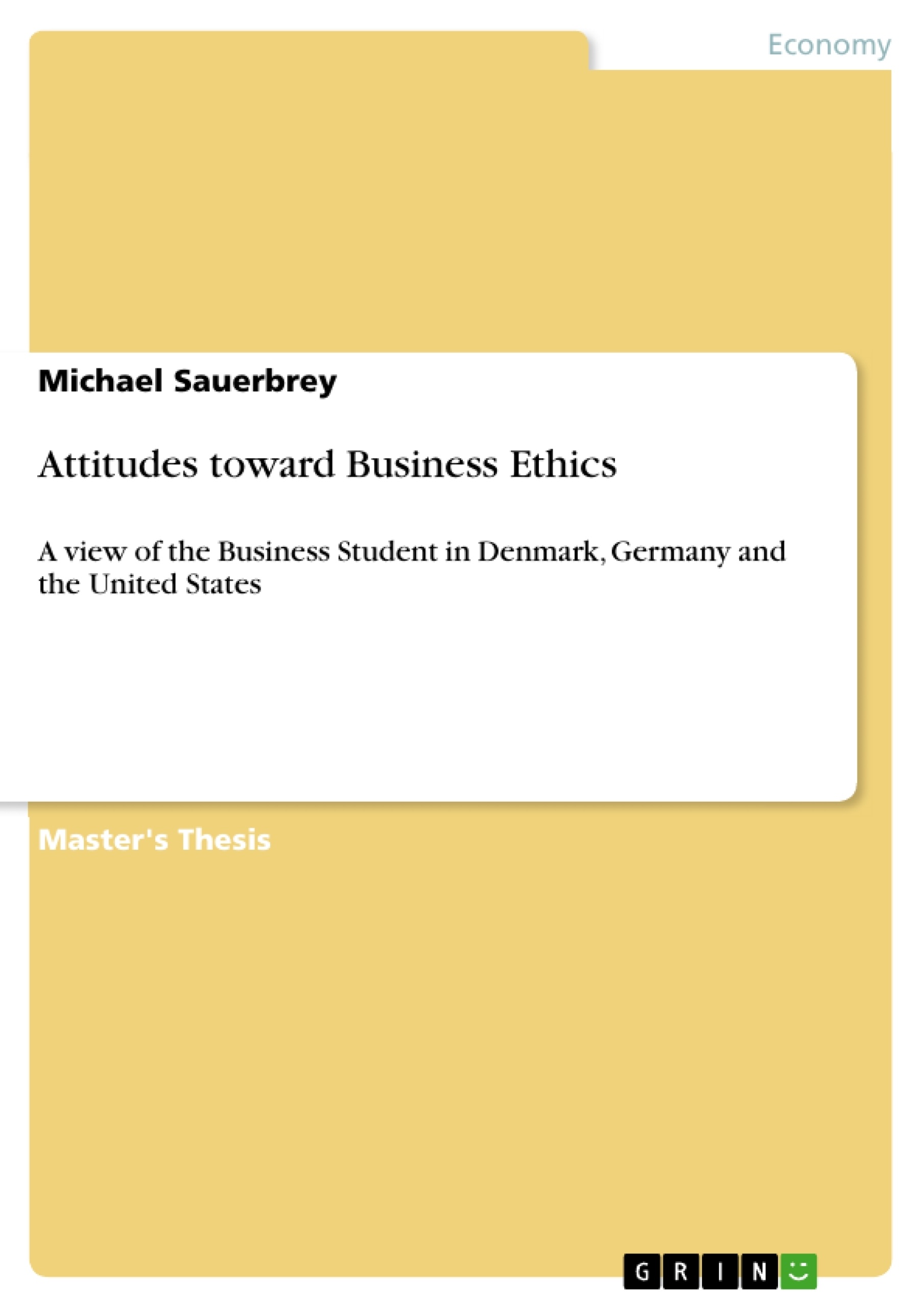Business is essential for the development and well-being of a society. However, business does not exist in a vacuum, but is simultaneously dependent on a number of stakeholders, be it employees, customers, investors, interest groups, or the government. In this sense, an extensive and critical debate about the role and conduct of business, and their associated corporate responsibilities in the community, is taking place among academics and practitioners alike. Thereby, it is essential to consider that the practices of corporations are first and foremost resulting from decisions and behaviors of human beings. Business students in their role as future managers are likely to be faced with critical ethical decisions in their daily work routine. Thus, investigating their moral mindset about aspects of business ethics is of great importance. Therefore, the purpose of this master thesis was first of all to critically reflect the academic literature, and present a theoretical framework that addresses valuable concepts with regard to the good life and the just social coexistence of business and society. In a second step, a comprehensive empirical research was conducted, which studied the attitudes toward aspects of business ethics among 1.271 business students in Denmark, Germany, and the United States, using a self-report online questionnaire. Participants evaluated a wide range of questions regarding the moral dimensions underlying the relation of business and society. They were furthermore asked to specify primary and social corporate responsibilities, to define a well-run company, and to state personal criteria that are relevant for them in a notional job offer situation. Gathered data were analyzed on differences among nationalities, as well as on distinctions within the three countries in terms of gender, academic level, age, and business ethics education. Findings revealed optimistic and critical effects alike. Attitudes differed significantly among the three countries in a high number of aspects. Females showed stronger ethical attitudes than males. The impact of a business ethics course was positive, but varied in intensiveness among the three countries. Similarly, undergraduate and graduate students signified differing effects that intensified with age. In general, business students indicated their importance for social factors, and responsible corporate behavior. However, they prioritized career aspects over social criteria ... (to be continued) ...
Inhaltsverzeichnis (Table of Contents)
- ACKNOWLEDGEMENT
- THE WORLD NUMERICAL
- ABSTRACT
- TABLE OF CONTENTS
- PART ONE: INTRODUCTION
- 1. INTRODUCTION
- 1.1 PROBLEM STATEMENT
- 1.2 OBJECTIVES
- 1.3 RESEARCH QUESTIONS
- 1.4 DELIMITATIONS
- 1.5 THESIS OUTLINE
- PART TWO: THEORETICAL FRAMEWORK
- 2 PROLOGUE FOR BUSINESS ETHICS
- 2.1 MORALE, ETHICS, AND BUSINESS ETHICS
- 2.2 CRITIQUE OF ECONOMISM
- 2.3 BUSINESS: THE QUESTION OF MEANING
- 2.4 BUSINESS: THE QUESTION OF LEGITIMACY
- 3 ETHICAL THEORIES & BUSINESS ETHICS
- 3.1 TRADITIONAL THEORIES
- 3.2 CONTEMPORARY THEORIES
- 3.2.1 THE VIRTUE PERSPECTIVE
- 3.2.2 THE STAKEHOLDER PERSPECTIVE
- 3.2.3 THE SOCIAL CONTRACT PERSPECTIVE
- 3.2.4 THE INTEGRATIVE PERSPECTIVE
Zielsetzung und Themenschwerpunkte (Objectives and Key Themes)
This master thesis examines the attitudes of business students towards business ethics, with a particular focus on Denmark, Germany, and the United States. The primary objective is to provide a theoretical framework for understanding business ethics and to conduct empirical research to analyze the moral mindsets of future managers. The thesis aims to identify differences in attitudes among the three countries and to investigate the influence of factors such as gender, academic level, age, and business ethics education.
- The role of business ethics in society
- The moral dimensions of business practices
- Corporate social responsibility and stakeholder relationships
- Ethical decision-making in business
- Attitudes towards business ethics among business students
Zusammenfassung der Kapitel (Chapter Summaries)
The thesis begins by introducing the problem statement, outlining the objectives and research questions, and defining the delimitations of the study. Chapter 2 provides a theoretical foundation for understanding business ethics, exploring the concepts of morale, ethics, and the critique of economism. Chapter 3 delves into ethical theories, focusing on traditional and contemporary approaches, including the virtue perspective, the stakeholder perspective, the social contract perspective, and the integrative perspective.
Schlüsselwörter (Keywords)
This master thesis investigates the attitudes towards business ethics among business students in Denmark, Germany, and the United States, exploring key concepts such as corporate social responsibility, stakeholder relationships, ethical decision-making, and the moral dimensions of business practices. The research utilizes empirical data analysis to examine the influence of factors like gender, academic level, age, and business ethics education on student attitudes.
Frequently Asked Questions
What is the main objective of this thesis on business ethics?
The thesis investigates the moral mindset and attitudes toward business ethics among business students in Denmark, Germany, and the United States.
Which countries were involved in the empirical research?
The study analyzed data from 1,271 business students across Denmark, Germany, and the United States.
Do female students have different ethical attitudes than males?
Yes, the findings revealed that female students generally showed stronger ethical attitudes than their male counterparts.
Does business ethics education have an impact?
The impact was found to be positive, although the intensity of the effect varied among the three countries studied.
What ethical perspectives are discussed in the theoretical framework?
The thesis covers traditional and contemporary theories, including virtue, stakeholder, social contract, and integrative perspectives.
- Quote paper
- Michael Sauerbrey (Author), 2010, Attitudes toward Business Ethics, Munich, GRIN Verlag, https://www.grin.com/document/156549



